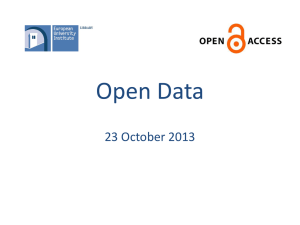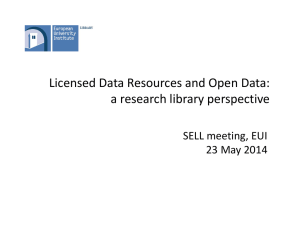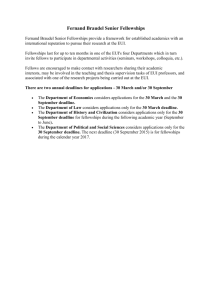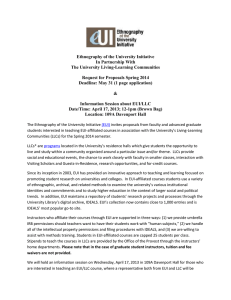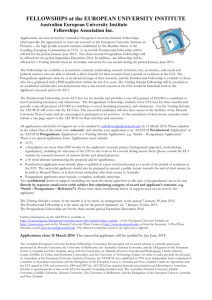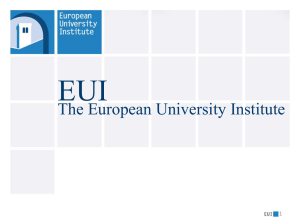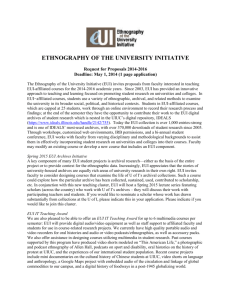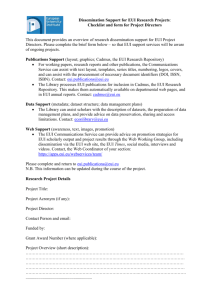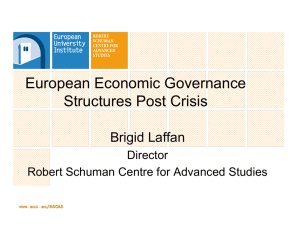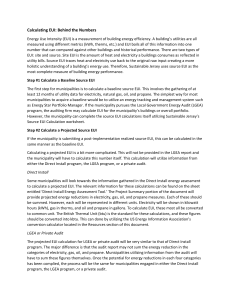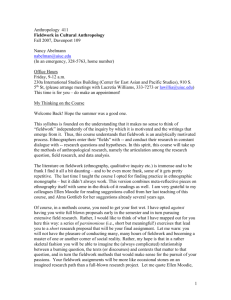ECO 10 - Further Particulars - European University Institute
advertisement
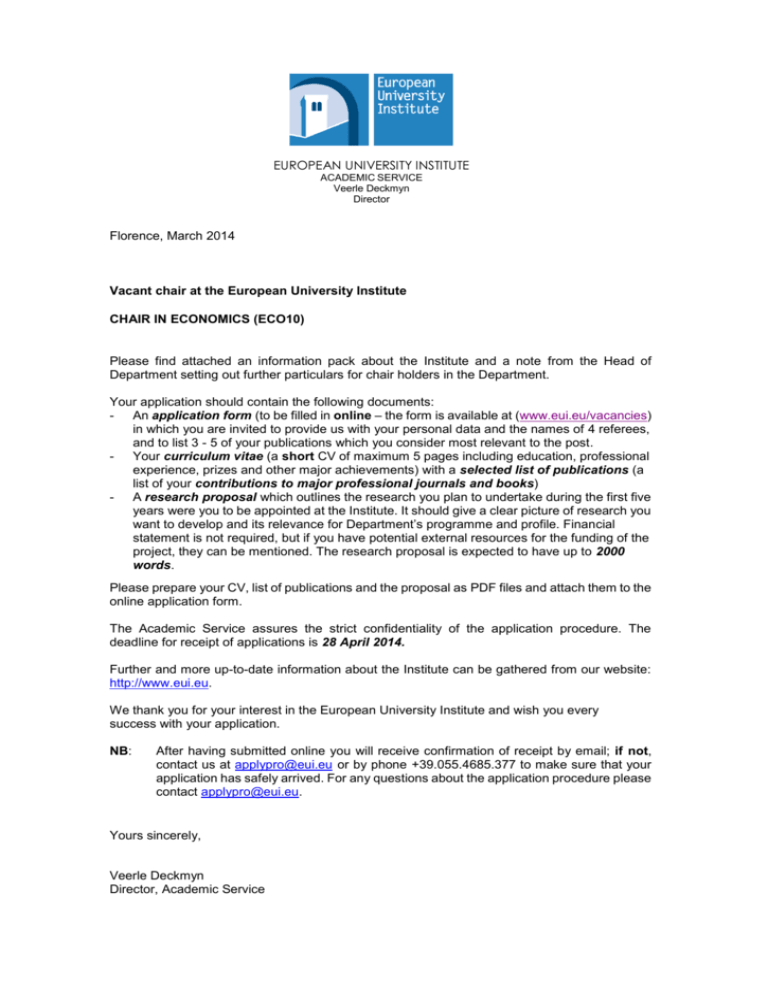
EUROPEAN UNIVERSITY INSTITUTE ACADEMIC SERVICE Veerle Deckmyn Director Florence, March 2014 Vacant chair at the European University Institute CHAIR IN ECONOMICS (ECO10) Please find attached an information pack about the Institute and a note from the Head of Department setting out further particulars for chair holders in the Department. Your application should contain the following documents: - An application form (to be filled in online – the form is available at (www.eui.eu/vacancies) in which you are invited to provide us with your personal data and the names of 4 referees, and to list 3 - 5 of your publications which you consider most relevant to the post. - Your curriculum vitae (a short CV of maximum 5 pages including education, professional experience, prizes and other major achievements) with a selected list of publications (a list of your contributions to major professional journals and books) - A research proposal which outlines the research you plan to undertake during the first five years were you to be appointed at the Institute. It should give a clear picture of research you want to develop and its relevance for Department’s programme and profile. Financial statement is not required, but if you have potential external resources for the funding of the project, they can be mentioned. The research proposal is expected to have up to 2000 words. Please prepare your CV, list of publications and the proposal as PDF files and attach them to the online application form. The Academic Service assures the strict confidentiality of the application procedure. The deadline for receipt of applications is 28 April 2014. Further and more up-to-date information about the Institute can be gathered from our website: http://www.eui.eu. We thank you for your interest in the European University Institute and wish you every success with your application. NB: After having submitted online you will receive confirmation of receipt by email; if not, contact us at applypro@eui.eu or by phone +39.055.4685.377 to make sure that your application has safely arrived. For any questions about the application procedure please contact applypro@eui.eu. Yours sincerely, Veerle Deckmyn Director, Academic Service EUROPEAN UNIVERSITY INSTITUTE DEPARTMENT OF ECONOMICS http://www.eui.eu/ECO FURTHER PARTICULARS ABOUT FACULTY POSITIONS IN THE DEPARTMENT OF ECONOMICS Job description for the vacant chair Chair in Economics (ECO10) The Department of Economics invites applications for a Chair in Economics. To fulfil the needs of the Department's structured PhD programme, candidates must have experience in graduate-level formal instruction and doctoral supervision as well as a strong academic record. The chair is open to any field of economics, albeit preferences will be given to applicants with an excellent publication record in Empirical Microeconomics, such as labour, development, and health economics, industrial organization and economics of education. The Department promotes gender equality and cultural diversity. The chairs may be filled at all levels of seniority, although applicants should normally have completed their doctorate at least seven years ago. Working in the Department of Economics The European University Institute is a postgraduate research institute set up in 1976 by the Member States of the European Union. It is not an institution of the European Union, however: rather, it is an international treaty organisation in its own right, funded directly by the signatory states. The EUI consists of four academic departments - Economics, History and Civilization, Law, and Political and Social Sciences; an interdisciplinary postdoctoral training programme – the Max Weber Programme; and an interdisciplinary centre - the Robert Schuman Centre for Advanced Studies, supported by administrative, computing and library staff. The research students of the EUI are drawn mainly from the graduates of universities in the Member States, with a small number of students from outside Europe. In order to work effectively we all have to be fluent in English. In the Department of Economics, all academic activities are conducted in English. However all EU official languages are also EUI official languages, and French and Italian (mainly for administration) are the other common working languages. Teaching and Supervision About 25-30 postgraduate students are admitted each year to a four-year programme leading to the Ph.D. in Economics. The first year consists of a set of structured courses with instruction in English, and some course work continues into the second year of the programme. Students then undertake full-time research, leading to the submission of a doctoral dissertation and award of the Ph.D. All students from the EU Member States receive maintenance scholarships (conditional on progress) for 4 years, and for these students there are no fees. Full-time faculty members teach the equivalent of two 5-week courses per year (40 hours total) as part of the taught-course core of the programme (holders of joint Robert Schuman Centre posts teach only one). Each faculty member is associated with one of the research workshops with external speakers (currently, Econometrics, Micro, and Macro). These normally meet on a weekly basis, and provide a forum for students, faculty, and outside visitors to discuss current research. Finally, there are informal working groups where work in progress of students and professors is presented and discussed. Since about 25-30 students are admitted each year and a typical student will stay at the Institute for 4 years, each of the 13 full-time faculty members is expected to supervise 9-10 graduate students on average. New members tend to supervise a smaller number of students in the early years of their appointment and accumulate more as time goes by. Faculty members are obliged by their contract of employment to continue supervision of their students after their appointment expires. Research Members of the department pursue research and supervise dissertations in their own (broadly defined) field of specialization. The EUI, however, increasingly encourages research work directed at issues of particular concern in a European context. This policy is designed to capitalise on one of the perceived comparative advantages of the Institute and on the existing work of current and recent-past members of the Department. Supervision of policy-oriented technical research is also in heavy demand by the existing student body, and the EUI’s policy of consolidating and promoting the relevant expertise among the faculty is designed to provide a signal for potential students that dissertation work in this area will be especially welcome. At the EUI, support for research is excellent. The library is first class. There is one special librarian for each department whose job is to keep track of departmental collections and to act as a liaison with Departments. The Computer Service has good resources to support research in all areas of Economics. Faculty research at EUI is funded on an annual basis. Faculty members receive a lump-sum (currently euro 7.500 per year) towards standard research expenses. They may also prepare proposals for cooperative and ‘seed’ research projects. These are reviewed and may be funded by the Research Council, a group composed of external advisors coming from academia and practice. In addition, professors are encouraged to raise external funds as the internal resources might cover only part of the needs. Administrative Duties Departmental meetings are held monthly. In addition, the Department meets several times per year as an Exam Committee to evaluate students’ progress and process the applications of incoming students (shortlisted applicants are interviewed in the spring). One faculty member acts as Head of Department, and meets frequently with the Heads of other Departments and with the President of the Institute to prepare the monthly meeting of all faculty at the Institute, the Academic Council, and make many routine decisions. Within the Department, some colleagues take responsibility for co-ordinating course-work, admissions, exams, placement, and selection of post-doctoral fellows. Others serve on Institute-level committees, dealing with Library and Information Technology issues, with Computing Services, with Admissions, etc. As to selection of new colleagues, only some members of the Department sit on Committees charged with submitting a recommendation to Academic Council. All members of the Department, however, cooperate in processing the applications. The Department typically invites shortlisted candidates for a brief visit, including a seminar and opportunities to discuss with students and potential colleagues. Staff in the Department The Department of Economics comprises at present 12 professors (two hold a joint appointment with the Robert Schuman Centre for Advanced Studies), a Departmental assistant and three secretaries. Each year a number of post-doctoral and senior fellows join us for a limited period, hosted respectively within the Max Weber and Fernand Braudel Programmes, in order to work on their research projects. These often work closely with an individual professor or group of professors. In addition, scholars occasionally visit the Department for shorter periods, offering brief lecture courses in their fields of interest. Additionally, we receive the visits of colleagues from all over the world, who come and present their work in our research workshops series. Conditions of employment – salary - benefits The European University Institute is an equal opportunity employer. Full-time professors at the EUI are appointed on a five-year contract which may be renewed for further three years. Professors are frequently able to obtain extended leave from their home institutions. Salary The amount of take-home salary can vary and depends on seniority, eligibility to expatriation, household and dependent children allowances. The Personnel Service is available for providing more information on the basis of the actual family situation of the short-listed candidates. Additional benefits The Institute covers moving expenses to and from Florence (up to a maximum equivalent of a monthly basic salary) in addition to a settlement allowance calculated on each individual family situation. Faculty members and their families are entitled to a flat-rate payment of travelling expenses from Florence to the place of origin; the flat-rate payment is based on an allowance calculated on distance. Faculty members at the Institute are covered by health insurance administered by the Joint Sickness Insurance Scheme of the European Communities Ispra Settlements Office. An average of 80% of medical or dental expenses is reimbursed upon presentation of invoices. Some treatment (dental braces, for example) requires authorisation in advance. There is a generous educational allowance for school or university costs of Institute members’ dependent children. 10,25% of an EUI professor’s salary is withheld for a severance payment scheme; twice this amount is contributed by the Institute (total monthly contribution = 30,75%) This can be paid into a national or private retirement scheme, or into the Institute’s plan. If the latter option is selected, the amount due is paid to the EUI member upon departure. Under the terms of the treaty establishing the Institute, EUI professors are exempt from income tax on their salary paid by the Institute anywhere in the Contracting states. In lieu of national taxes, a deduction is carried out by the Institute. Further details on all information contained in this note are available from the Personnel Service. The recruitment procedure at the EUI The selection procedure at the EUI has some specific features due to our character as an international (European) organisation, and to the fact that our faculty is based on medium-term appointments with a high level of turn over. Procedure and organs involved Several Committees and Councils are involved in our selection procedure, which is regulated by Decision n° 2/03 of the High Council of the EUI: - the Department of Economics (all professors of the Department) - the Academic Council (all EUI professors and the President of the Institute) - the Selection Committee When a chair is vacant, the Department submits a profile for the chair to be filled to the Academic Council, which sets up the Selection Committee. The composition of the Selection Committee depends on the appointment in question (i.e. a committee for one chair only, joint committee for more than one chair, or committee for a joint chair Department/the RSCAS). The selection committee is composed of professors from the EUI, external experts, the President of the EUI (consultative voice) and a representative of the researcher students (consultative voice). The composition of the Committee is kept confidential until the invitations for interviews are sent to shortlisted candidates. They will receive further information about the composition of the selection committee. After publication of the vacancy and reception of applications, the Committee may either draw a short list of candidates to be interviewed or turn into a search Committee, which happens whenever the number and/or quality of applications does not seem adequate. Having set up a shortlist the Committee subsequently interviews the shortlisted candidates and submits a recommendation of one or more candidates to be appointed. The Committee's recommendation is transmitted to the Academic Council, which acts as a sovereign body for appointments. A recommended candidate is appointed if the majority (50%+1) of members present vote in favour. Application file Your file should demonstrate how your application covers the job description above, and it should contain the following elements: CV: Please present a short CV of maximum 5 pages including education, professional experience, prizes and other major achievements. List of publications: Please present a list of contributions to major professional journals and books. Referees: Applicants are requested to submit four names of possible referees whom the EUI may contact. The referees may not include members of the professorial staff of the EUI. Please try to give us the names of referees who know you in both your teaching and a research functions. E-mail addresses are essential in order to get a quick confidential reply. The Selection Committe may consult other external experts if it considers that helpful to its deliberations. Research project: Please take great care in presenting your research project(s), which should be designed to cover a five year contract and correspond to the profile. The Selection Committees always attach considerable importance to the quality of the proposals. The project should be written in English, and have a length of up to 2000 words. It should specify the objectives and scope of the project and give indications on the background, especially how it relates to work you have already undertaken and published. It should also give some preliminary indications about the methodology you intend to follow in exploring the proposed hypotheses or theories; guidelines; indications as to the empirical components and sources; management of the research especially its organisation and the possible running of a research team. It should also give some preliminary indications on the type of outcome and the type of support for publication you have in mind. Formal applications should be submitted online (www.eui.eu/vacancies) by 28 April 2014. For any queries about the application procedure you may contact applypro@eui.eu. Practical information about life in Florence Learning Italian The Institute’s language service offers intensive Italian courses in September and less intensive courses throughout the year. Some other European languages are also taught. Florence has an abundance of private language schools. Housing Rents are very variable, likely figures for Florence and its immediate surroundings are: 750-1000 Euros for a one-bedroom flat and 1000-1300 Euros for a two-bedroom flat. Larger flats with three or four bedrooms can rise to 2000-3000 Euros (villas or large luxury flats). The Logistics Service has a Housing Office to help new faculty find suitable private accommodation. It gathers offers of private accommodation (houses, studios and rooms, generally furnished) within a radius of 10 to 12 kms from the Institute. The housing office can provide advice with finding accommodation. Where to live depends on taste, and you should acquire additional information from the Institute’s Housing Office. There is much to be said for renting a casa colonica (farmhouse) in the countryside as this will ensure that you are in contact with the real Italy but it can, however, be somewhat isolated and cold in winter. Equally there is much to be said for living in Florence proper. There is an excellent public transportation system. Living in Florence has all the pluses and minuses of living in a medium-sized city. Schools For infants, there is a crèche run by the Institute near Villa Schifanoia. For young children (8 or below), the Italian system should be seriously considered if you intend to remain eight years in Florence. There is a menu of private and public Italian schools to choose from. Many State schools still have a 6-day week, which makes it tough to take weekend trips around Tuscany. Private schools are more likely to have a 5-day a week schedule. Details will vary from school to school, and your own reaction will depend on the national system that you use as a basis for comparison, but the general feeling is that in terms of quality the Italian system is satisfactory. Italian high schools (liceo) are differentiated by type (classico, scientifico, linguistico, others). They have the reputation of offering a traditional, i.e., rigorous but dry programme that gives good preparation for university. The French school offers a programme that goes from Maternelle to Terminale, a good programme that many at the Institute take advantage of. Further information is available at www.vhugo.eu. The International School of Florence (ISF) offers an elementary through to high-school programme in English. Places should be reserved as soon as possible and are expensive. The high school offers the International Baccalaureate, which is recognised for university entrance throughout the world. Its American high school diploma is also recognised by the Italian government as equivalent to that of a liceo linguistico. Further information: www.isfitaly.org. More detailed information about daycare and schools is available in our website at http://www.eui.eu/ServicesAndAdmin/HealthAndFamily/Children/Index.aspx. Potential applicants requiring information beyond that contained in these further particulars, or who would like to discuss the vacancies informally, are welcome to contact the Head of Department, Professor Piero Gottardi, tel. +39 055 4685 919, e-mail piero.gottardi@eui.eu.
